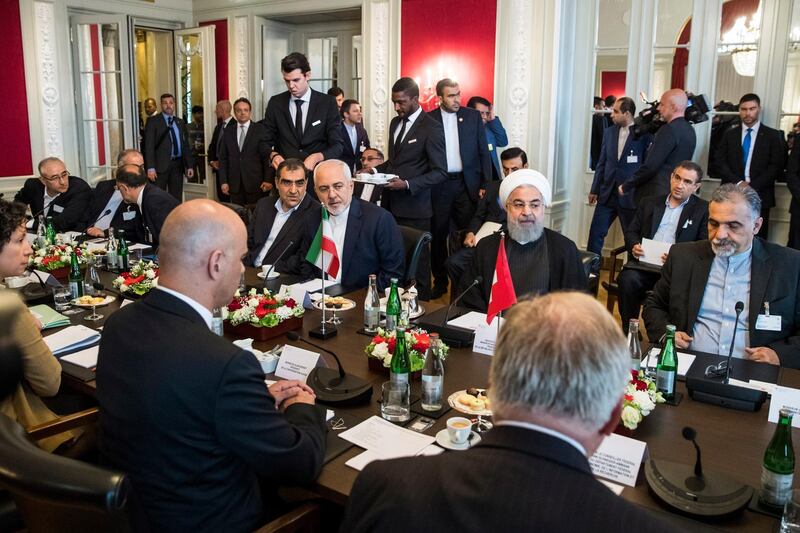Iran threatened retaliation against regional oil producers in the event that its revenue from export sales collapses as a result of US sanctions pressure.
Hassan Rouhani, the Iranian president, made the threats during a visit to Switzerland and as his country's officials prepare for negotiations with European counterparts in Vienna on Friday.
Speaking in Berne, Mr Rouhani made his most explicit warning yet that Tehran would target other countries to avenge its losses.
"Assuming that Iran could become the only oil producer unable to export its oil is a wrong assumption," he said. "The United States will never be able to cut Iran's oil revenues."
_______________
Read more: UAE orders asset freeze for nine Iran-linked individuals and companies
_______________
The remarks came a few hours after a State Department briefing in Washington that set out plans to impose sanctions on buyers of Iranian oil from November. Only very limited sanctions relief would be on offer as the US pursues its goal of reducing Iranian oil revenues down towards zero. “We are prepared to work with countries that are reducing their imports on a case-by-case basis,” said Brian Hook, the director of policy planning at the State Department.
When Washington exited the 2015 deal to suspend Iran's nuclear programme, the US made it clear that European companies would not be immune as it reimposed a sanctions regime.
Dozens of European companies have already dropped plans for investment in Iran, including the French oil giant Total.
However Mr Rouhani is pressing the European states to offer protection to business and trade.
"It is incorrect and unwise to imagine that some day all producer countries will be able to export their surplus oil and Iran will not be able to export its oil," he said.
"Iran will remain committed to the deal, as long as its interests are preserved," Mr Rouhani said.
Mohammad Javad Zarif, the Iranian foreign minister, is due to meet counterparts from Britain, France and Germany, as well as Russia and China, in the Austrian capital to flesh out the guarantees that Iran seeks.
The five countries have all said they still support the deal despite the decision to withdraw.
"At the meeting, which will be held at the request of Iran, foreign ministers of Iran and five world powers will discuss a proposed European package and measures to protect the agreement," Iranian state news agency IRNA said.
_______________
Read more: Iranian diplomat at centre of bomb plot inquiry to lose immunity
_______________
European leaders could use the powers under a so-called blocking statue to ban companies from complying with the US sanctions. That would mean the states themselves could end up responsible for any fines the US levied.
Other proposals would see the European Investment Bank offer guarantees and loans to underwrite trade and investment in Iran. Experts believe the bloc could also use global trading rules to overturn Washington's penalties.
"The EU could, for example, take steps within the WTO to protect its trade relations with Iran against US sanctions," said Mahdi Ghodsi of the Vienna Institute of International Economic Studies.
The Iranian government itself could get round sanctions imposed on state-owned oil producers and distributors by allowing private companies handle the sales but the US Treasury would be likely to target these outfits as state proxies.
The biggest buyer of Iranian oil is China, which is likely to resist the US sanctions as well. Trade between Iran and Europe virtually halved after sanctions were tightened in 2011. The period since the Iran deal came into force has not seen a significant recovery in either exports or imports.
Federica Mogherini, the EU's foreign relations chief, has said the EU was determined to protect and deepen key sectors including Iranian energy sales, banking transactions and transportation ties.






